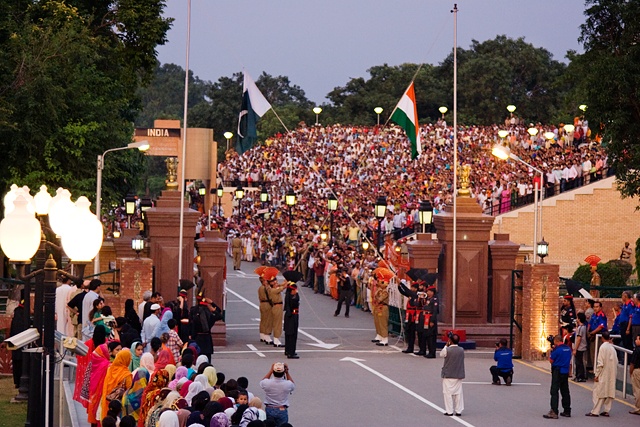Opinion | India integral to Biden’s Asia-centric foreign policy | I
Authorities commence the evening flag lowering ceremony at the India-Pakistan International Border near Wagah in August 2017. Columnist Eddie believes that India is integral to Biden’s Asia-related policy.
Mar 8, 2021
Just one month into the Biden presidency and with a plethora of domestic concerns at the forefront of public consciousness, one acknowledges that an appraisal of this administration’s foreign policy would be premature. This notwithstanding, in light of some rather propitious tone shifts on Russia and Saudi Arabia, the temptation to indulge in a bit of speculation and prescription here is tough to resist.
As it should do, China occupies the preeminent position on a foreign policy docket more deliberately geared towards Asia than those of Biden’s predecessors — We shall see if this lasts, one foreign policy expert grumbles in the above piece, since “pivots to Asia” always end with “divots in the Middle East.”
Whether or not an Asia-centric mentality congeals at the Pentagon, heightened attention must be paid to India. This reasoning is two-pronged: first, on account of Kashmir, home to a decades-long thermonuclear cold war between India and Pakistan; second, because of the ongoing and widespread farmers strikes. Both are emblematic of the callousness of Prime Minister Narendra Modi’s Bharatiya-Janata Hindu nationalist party, which constitutes a conspicuous threat to the Kashmiri and Indian peoples.
Biden would do well to align the US with the subjugated peoples of the subcontinent on these fronts. To reaffirm his recently donned progressive colors, however, he must do so in good faith.
Immediately following the emancipation of India and Pakistan from British ownership in 1947, Kashmir emerged as a flashpoint of nationalist, religious and economic tensions between the two nations. In quasi-parallel with Palestine, Cyprus and Kurdistan, Kashmir reflects the grave consequences of externally imposed territorial partition and represents one of the more venerable self-determination struggles of the contemporary lot.
Get The Daily Illini in your inbox!
This Himalayan region stretching from northern India through northeast Pakistan was afforded the chance to accede to either of its would-be patrons; initially favoring independence, it only sought India’s support after incursions from Pakistani tribes aiming to recuperate it to their homeland. Thus erupted the first of several wars between the two neighbors and the prolonged period of tension that ensued, rendered starker in recent decades by the introduction of apocalyptic weaponry.
Today, both countries claim all of Kashmir, though each controls only certain portions of it. Recent events of conflict include a series of airstrikes and counterstrikes between the adversaries in 2019, a scuffle which precipitated highly controversial legislation from Modi in the Indian-administered territory. Namely, he succeeded in revoking Article 370, a constitutional clause that had provided considerable autonomy in Indian Kashmir, as well as in doubling down on curfews and police invigilation.
In spite of a tenuous ceasefire agreed upon last month, the recent introduction of Taliban-style sticky bombs — secretive explosives which can be detonated remotely and attached to vehicles — seems to foreshadow less than a sustained period of tranquility in the region.
Short of any underhanded interference, militaristic or otherwise, which would likely have horrendous consequences, the Biden administration must turn its attention to the present opportunity for diplomatic facilitation. Both Biden and Vice President Harris have already proven more amenable to leveling harsh critiques against Modi than their predecessors, and Harris’ Indian heritage could amount to some leverage in discussions of human rights abuses in Kashmir.
If neither leader concretely and decisively counteracts Modi’s demagogy, then they must be pressured to do so, a strategy likely to prove necessary on other progressive and internationalist fronts. This is not to imply, however, that the solutions here are simple or that the remedy to a 70-year geopolitical saga is ready-made. Indeed, America is perched rather unfavorably between two allies, neither of which is all that agreeable much of the time, in a context which quite directly involves China.
Indian-administered Kashmir is, in fact, India’s only majority Muslim state, and many of its members favor either independence or absorption into Pakistan. Given the wholly detestable state of human rights in Pakistan, where honor killings, forced conversions of young Hindu girls and capricious applications of a blasphemy law aimed at stamping out dissent go unabated, I personally wouldn’t favor the latter option. This conviction is strengthened by the observation that Pakistan itself is an acronym for Punjab, Afghan, Kashmir and Indus-Sind, an indication of an ambitious, revanchist appetite that at least rivals that of India.
Nevertheless, such are the demographic realities to be straddled by the U.S. in any facilitating role. In view of this, the most prudent and noble approach would position advocacy for Kashmiri civil liberties and restored autonomy as the foremost American demands on India.
A simple human rights focus could earn favor in Pakistan, a strong ally of China, without intimating to the Pakistanis any sort of allegiance regarding Kashmir’s eventual fate. An eye must instead be subtly kept to future independence rather than to its continued servility to either state.
Eddie is a sophomore in LAS.






